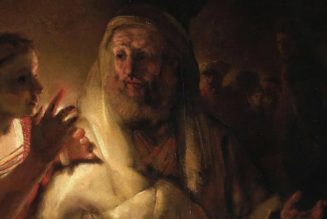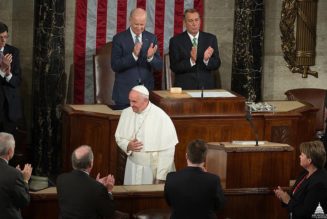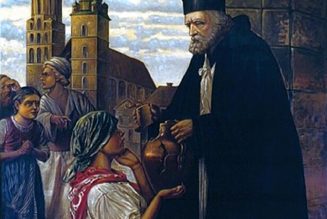Christmas is not the birth of Christ; what the birth of Christ was, and is, will never change. Christmas is a celebration, a remembrance and marking of the birth of Christ – and it has changed, and is still changing.
“People ask themselves how much remains of this observance and of the feast and its customs.” So mused Hilaire Belloc over ninety years ago in his essay, “A Remaining Christmas.” Cognizant of a general loss of age-old Christmas traditions, Belloc set out to record how Christmas was still celebrated in his home in Sussex. Much more than a tale of quaint holiday practices, the essay is a profound reflection on the place of such observances in human life.
“Man has a body as well as a soul, and the whole of man, soul and body, is nourished sanely by a multiplicity of observed traditional things.”
Belloc focuses especially on how two great threats to the wholeness of human existence – namely death, and “a perpetual series of lesser deaths … called change, are challenged, chained, and put in their place by unaltered and successive acts of seasonable” observances.
In Belloc’s vision, the observance of Christmas is taken up into something large and serious. At stake here is something far beyond contemporary conceptions of “How was your Christmas?” How we keep Christmas has a real urgency; at issue is our happiness, and even our sanity. Belloc was keenly sensitive to the rending power of what St. Augustine called death-in-life: change. Change is often experienced as a threat to what we hold most dear; we have a natural desire to get beyond change, and to rest secure in that which is stable. The greatest things in life are those that don’t change, or those that we would rather didn’t have to change.
Yet change is essential to the human lot in this world, and the quality of our life depends upon reckoning well with it. Observances such as that of Christmas are a central element of this well-reckoning. To do Christmas well, according to Belloc, is to connect self and loved ones with something unchanging. Keeping Christmas well, in other words, can keep us well.
Part of the connection with things unchanging is precisely that our observances are traditional: handed down by those who went before, and received and continued, essentially unaltered. Going through the same motions, especially as regards things sacred, somehow makes us one again with those absent. They are with us in what we do just as they did.
As a child, I always looked forward to Christmas for some time before it came. When Christmas had come and gone there was always a strong note of sadness, even regret. I don’t think this necessarily means there was something wrong in our celebration, though it could mean that. While there will surely always be a certain sadness at the passing of this great season, I think the more we become capable of celebrating Christmas rightly, the more our observance will have the power to raise us above, and even transform, our sorrows.
Christmas is the primordial birthday celebration. When a baby is born into a home, something utterly unique happens. On that day, and for a number afterwards, it is as though time stands still. Something much greater and more significant than work-a-day concerns has broken through. Our baby is here. He belongs to us; we belong to him. And nothing else matters, now that we are together. Or in any case, nothing can take away our joy. The days are filled with soft blankets, beautiful cards, balloons, photos, special meals – all imbued with the power of that baby’s presence.
Christmas can be that way, too. A baby has arrived in our home, and all of us together receive him. He belongs to us; we belong to him. Nothing else matters now that we are together. And we mark this arrival with fitting signs and activities, all imbued with the power of that baby’s ongoing presence.
Hilaire Belloc (1870-1953), born of a French father and English mother, was a poet, historian, and essayist. His essay “A Remaining Christmas’ is a classic.
Note: This piece of mine was first published as an article at Aleteia.org and is re-posted here with permission.
YOU MAY ALSO LIKE:
“We must teach beauty not from horror of ugliness but rather by attraction to beauty.” Charles Peguy, ‘The School Teachers’ in Basic Verities Beauty is not the private reserve of the aesthete, nor the artist or the highly cultured. It is the inheritance of all. It is…
‘To participate in a tradition,’ ‘to be in a tradition’ means: to accept something handed down as a thing handed down. …anyone who carelessly rejects the external traditions or treats them with irony is doing something dangerous.” Josef Pieper, The Concept of…
“..and perhaps it will be pleasing to have remembered these things one day.” Virgil, The Aeneid I have to admit it: it’s been hard for me recently as I think back on when my children were younger. A few days ago my wife and I, and our eight year old son—who is seven…
Husband, father, and professor of Philosophy. Bacon from Acorns springs from one conviction: there is an ancient wisdom about how to live the good life in our homes, with our families; and it is worth our time to hearken to it. Let’s rediscover it together. Learn more.

Join us!
Please enter your email address to receive a Wednesday Quote and Reflection once a week. I would be honored to be partners in mining the wisdom of the ancients.
You have Successfully Subscribed!











